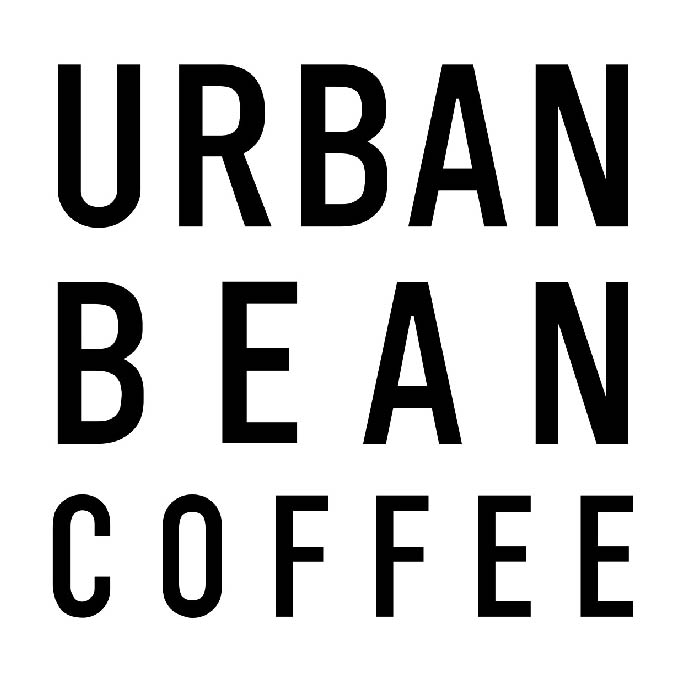The US is the largest coffee market in the world with over $80 billion in revenue, and almost 60% of the coffee sold in the country is brewed with premium beans.
To better understand the industry of freshly roasted coffee in the US, we conducted research.
We analyzed 481 US coffee roasters and looked at what services they offer to their customers.
Let's take a look at the results.
Here's a summary of our key findings:
- The average price for a 12oz bag of freshly roasted coffee is $16.90. The least expensive price is $7, and the most expensive bag will cost you $59.
- Brewing freshly roasted coffee at home allows you to cut costs. The price of a cup of freshly roasted coffee made at home is $0.74.
- At many roasters, you can taste coffee made with different bean varieties before purchasing. 66.1% of coffee roasters have a coffee shop.
- Roasters have an average of 3 coffee shops where they offer their coffee. A more accurate figure is 2.7 coffee shops per roaster.
- Coffee roasters offer an average of 12 types of coffee.
- Some coffee roasters offer both whole-bean and ground coffee. Ground coffee is offered by 54.7% of roasters.
- Most coffee roasters have a coffee delivery subscription service. Subscriptions are offered by 76.3% of roasters.
- Most coffee roasters are open to cooperation with coffee shops, bakeries, and other retailers. 78.2% of roasters sell coffee beans wholesale.
- Many coffee roasters do not educate consumers on how to prepare and drink coffee properly. 64.6% of roasters don't blog.
- Most roasters strive to stay connected with their customers. 69.4% of coffee roasters collect emails to send newsletters.
- More often than not, people on social media follow coffee roasters' Instagram pages. Roasters' average number of followers on Instagram is 12,382, compared to 4,464 on Facebook and 3,641 on Twitter.
The average price per bag of freshly roasted coffee is $16.90.
According to the National Coffee Association (NCA), 62% of Americans drink coffee every day.
Why did we choose to focus our research on freshly roasted coffee?
Because 42.9% of people choose coffee based on its taste.
The brightest, richest drink can be brewed with freshly roasted beans.
We decided to find out how much a bag of freshly roasted coffee costs.
After analyzing the prices at 481 coffee roasters, we found that the average price for a 12oz bag of freshly roasted coffee is $16.90.
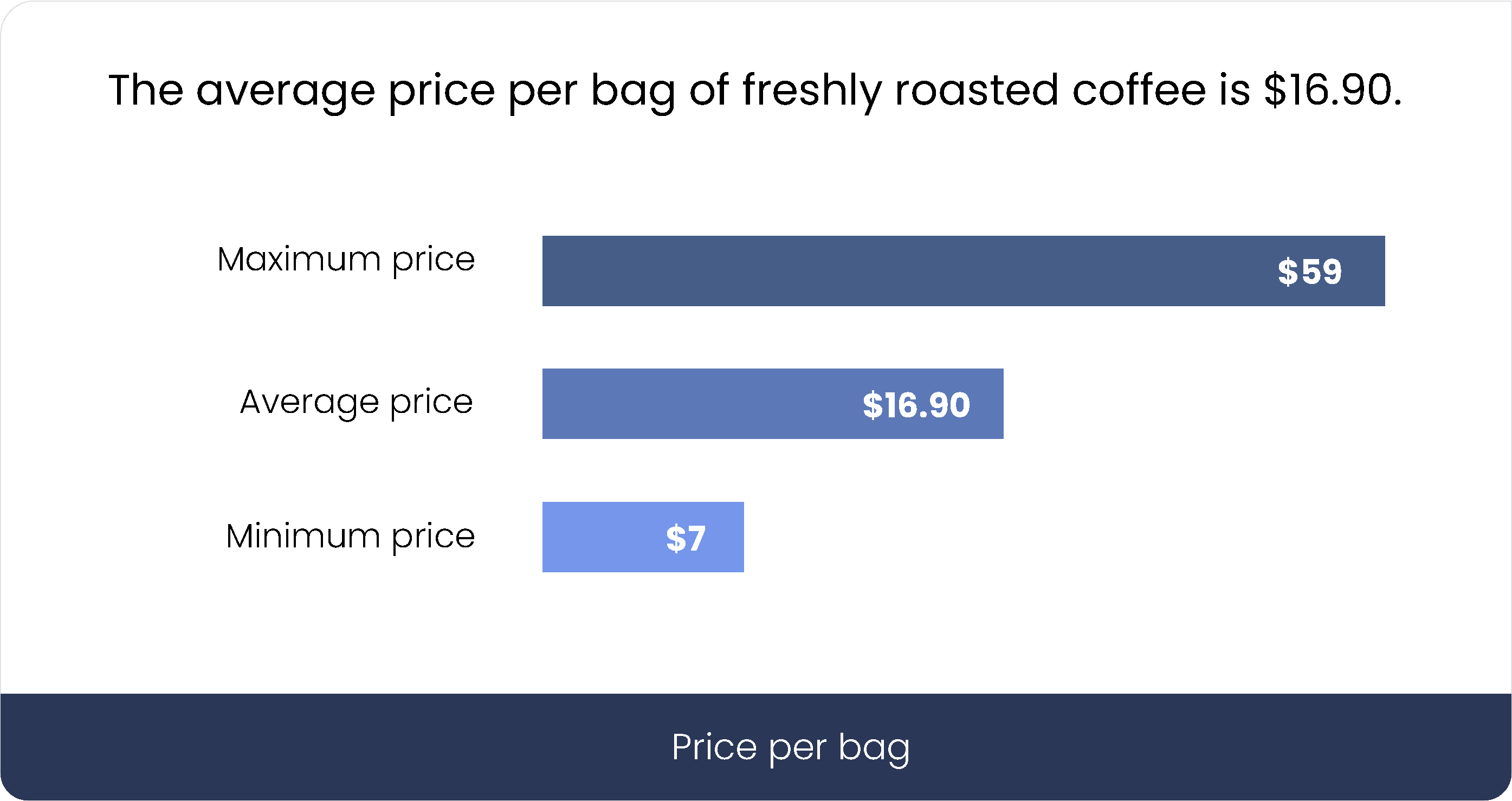
We also found that the minimum price for a bag of coffee is $7, and the most expensive bag will cost you $59.
The price of a cup of freshly roasted coffee made at home is $0.74.
NPD Group conducted research and found that the average price Americans pay for a cup of coffee at restaurants is $2.99 and the average price at gourmet coffee shops is $4.24.
If we consider that the average American coffee drinker drinks about 3 cups a day, then the average cost is $3,274-$4,642 per year.
We decided to find out if it's possible to reduce this cost by brewing coffee at home.
Given that the average price of a pack of freshly roasted coffee is $16.90, we made the following calculations.
We assumed that a person drinks 3 cups of coffee a day and that a standard pack of coffee in America contains 12 ounces (340 grams).
We chose an average dose of 15 grams of ground coffee per cup.
So almost 23 cups—22.7, to be exact—can be prepared from one pack of coffee.
That means one cup of freshly roasted coffee will cost an average of $0.74 if you make it at home.
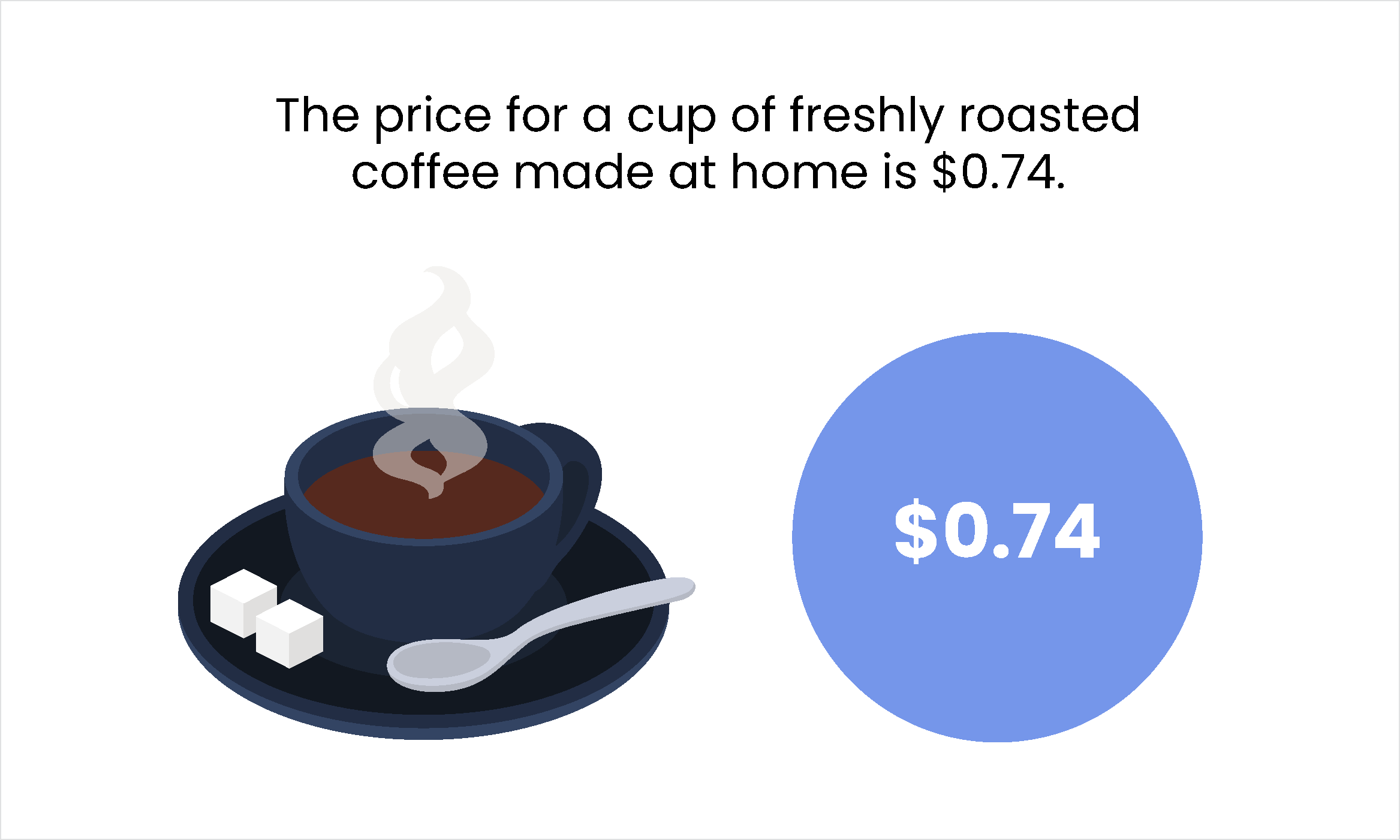
You can cut your coffee expenses by several times just by brewing at home.
Note that, depending on your taste preferences and brewing method, the dose of ground coffee per cup can vary from 10 to 30 grams.
This will either decrease or increase the cost of a cup of coffee brewed at home.
But even if you use 30 grams of ground coffee per cup, the average cost of the cup will be $1.50. This is almost three times cheaper than buying from a coffee shop.
66.1% of coffee roasters have a coffee shop.
Delicious coffee is a matter of personal preference.
Even the highest-quality, freshest coffee with a unique roast profile may simply not suit you.
Having the opportunity to taste coffee before buying can save you some frustration.
Through our research, we learned that you can try different bean varieties from most of the roasters in their coffee shops before buying.
66.1% of coffee roasters have a coffee shop.
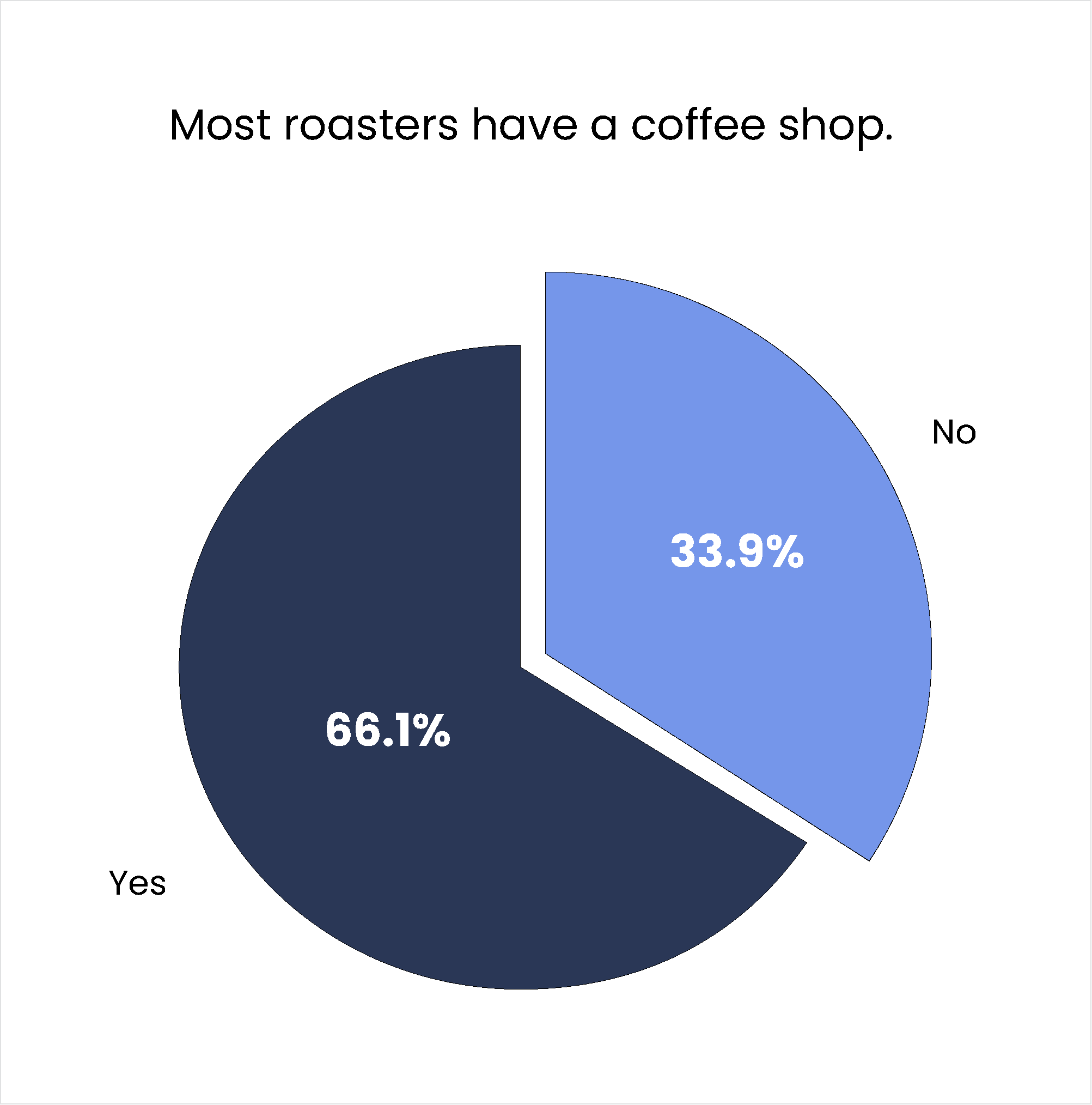
Roasters have an average of 3 coffee shops.
When a roaster has multiple points of sale, its coffee is more accessible to people.
Customers can choose a convenient location to buy their favorite coffee beans near their home or work.
We decided to see how many coffee shops roasters have.
Here's what we found:
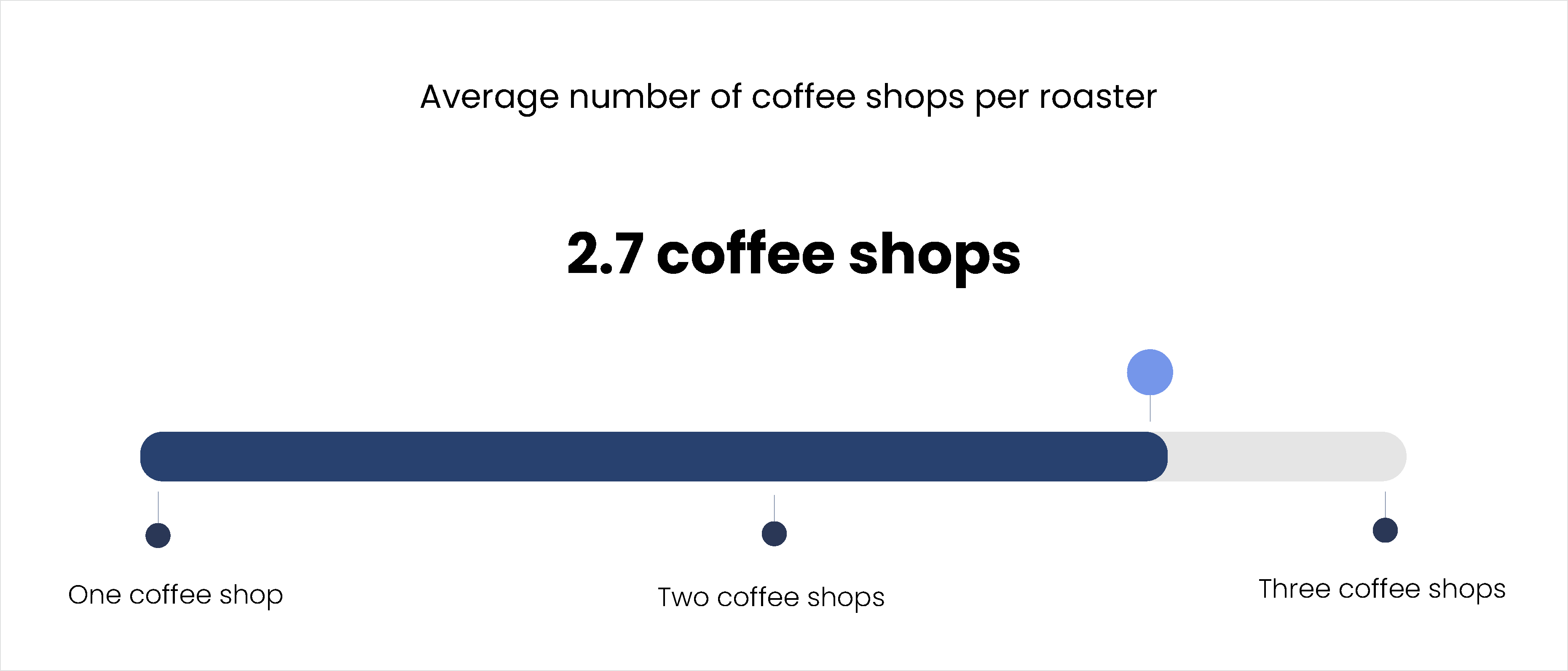
Roasters have an average of 3 coffee shops where they offer their coffee.
A more accurate figure is 2.7 coffee shops per roaster.
Roasters offer an average of 12 types of coffee.
Colombia and Brazil are the top coffee exporters to the United States, with medium roast being the most popular coffee roast among consumers.
During our research, we set out to study the range of coffees offered by roasters.
We were interested in the number of types of coffee available. We looked at both blends and single-origin coffee.
Here's what we learned:
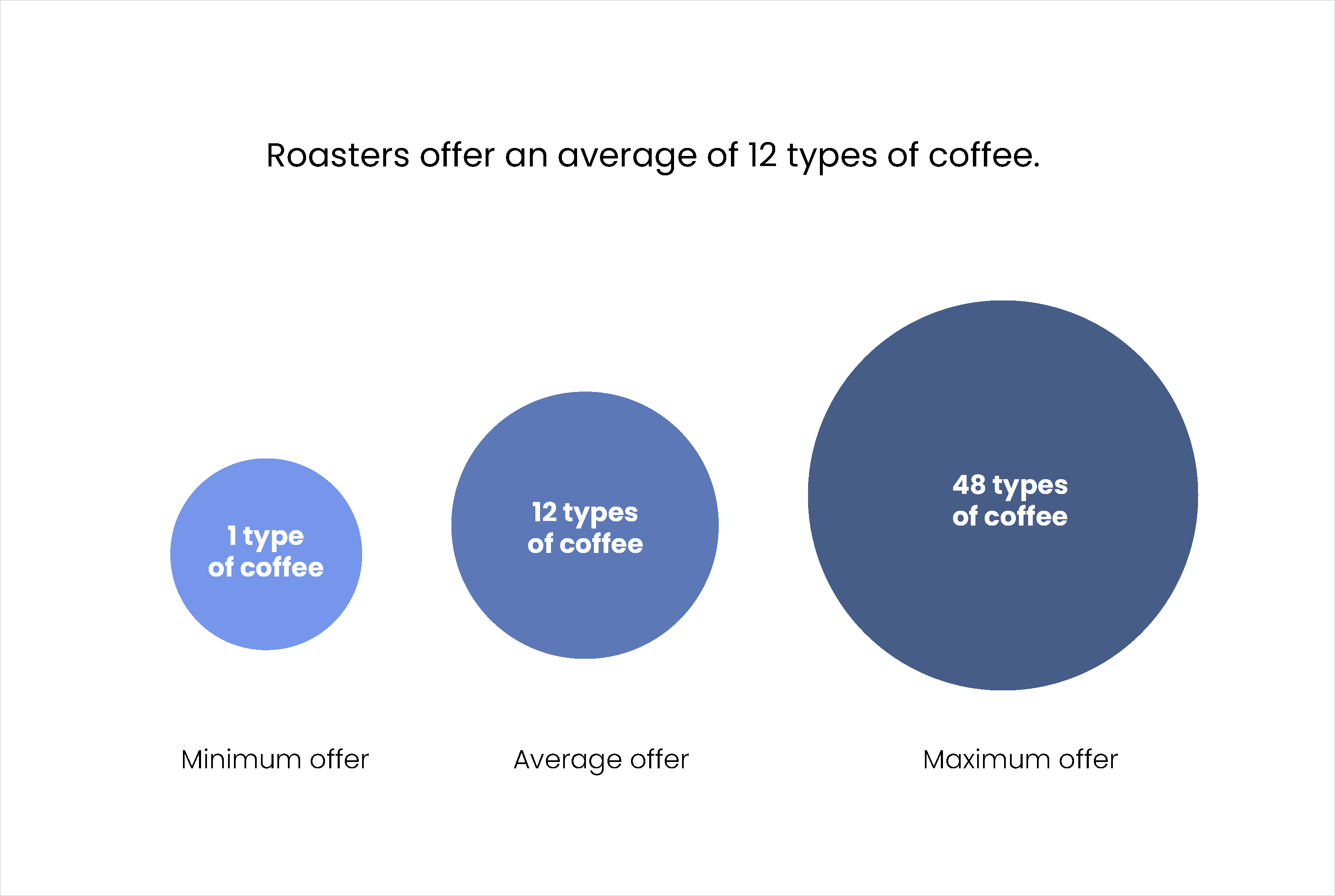
Coffee roasters offer an average of 12 types of coffee.
The maximum types of coffee offered is 48.
Roasters aren't limited to beans from Colombia and Brazil.
You can find coffees from different countries with specially selected roasting profiles.
This means you will have options to choose from wherever you go for freshly roasted beans.
Ground coffee is offered by 54.7% of roasters.
Coffee connoisseurs know that grinding beans just before brewing helps make a cup of coffee tastier and more aromatic.
But not everyone has a good coffee grinder at home that allows them to grind evenly and at the right size.
We decided to see if it's possible to order freshly ground beans from roasters.
We found that 54.7% of roasters offer ground coffee.
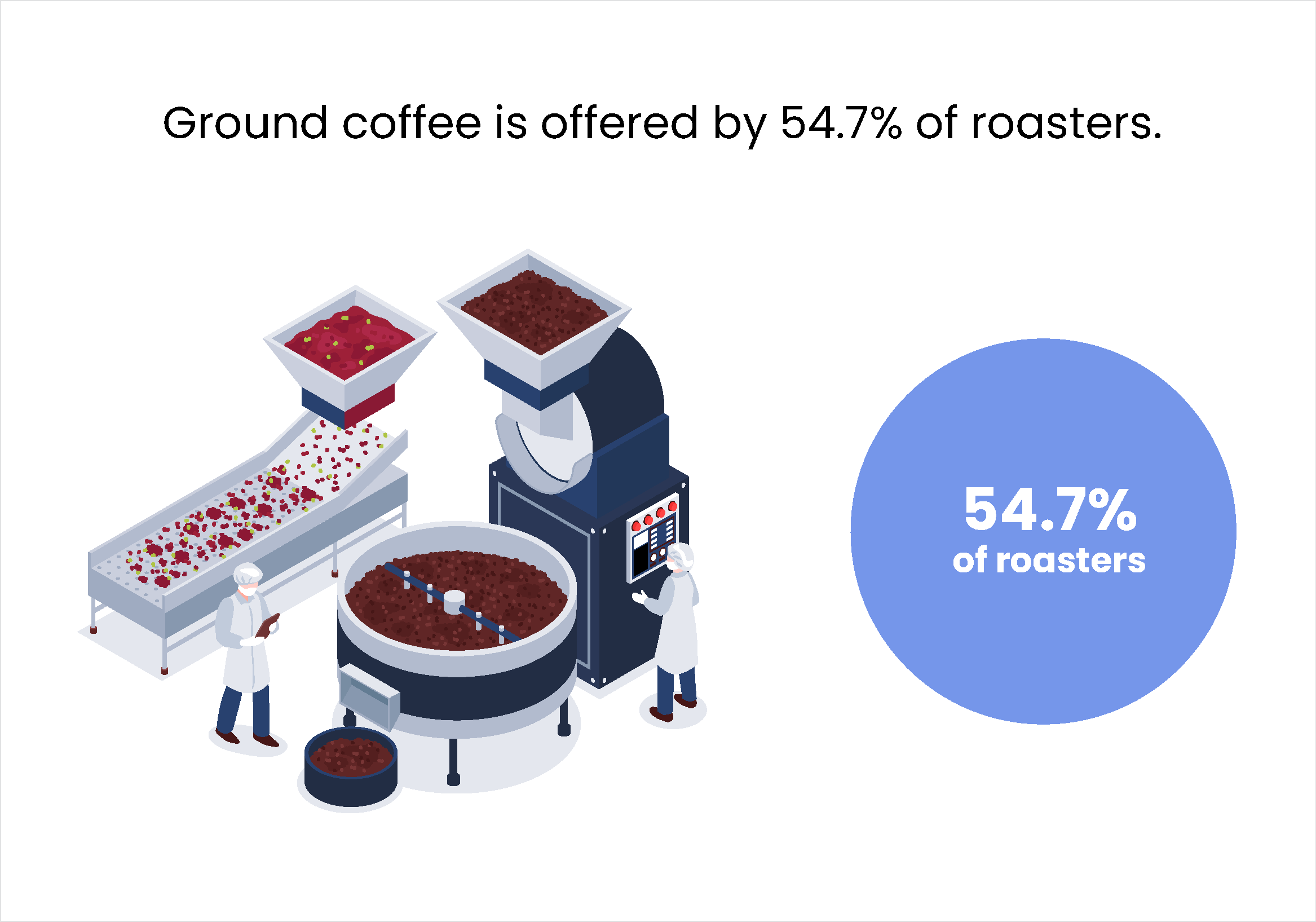
76.3% of roasters offer coffee subscriptions.
In 2020, coffee subscription sales grew by 109%, and the number of sellers offering this service increased by 25%.
One of our objectives was to find out how many roasters offer coffee subscriptions.
It turns out that most coffee roasters offer subscriptions so you can regularly receive freshly roasted beans via home delivery.
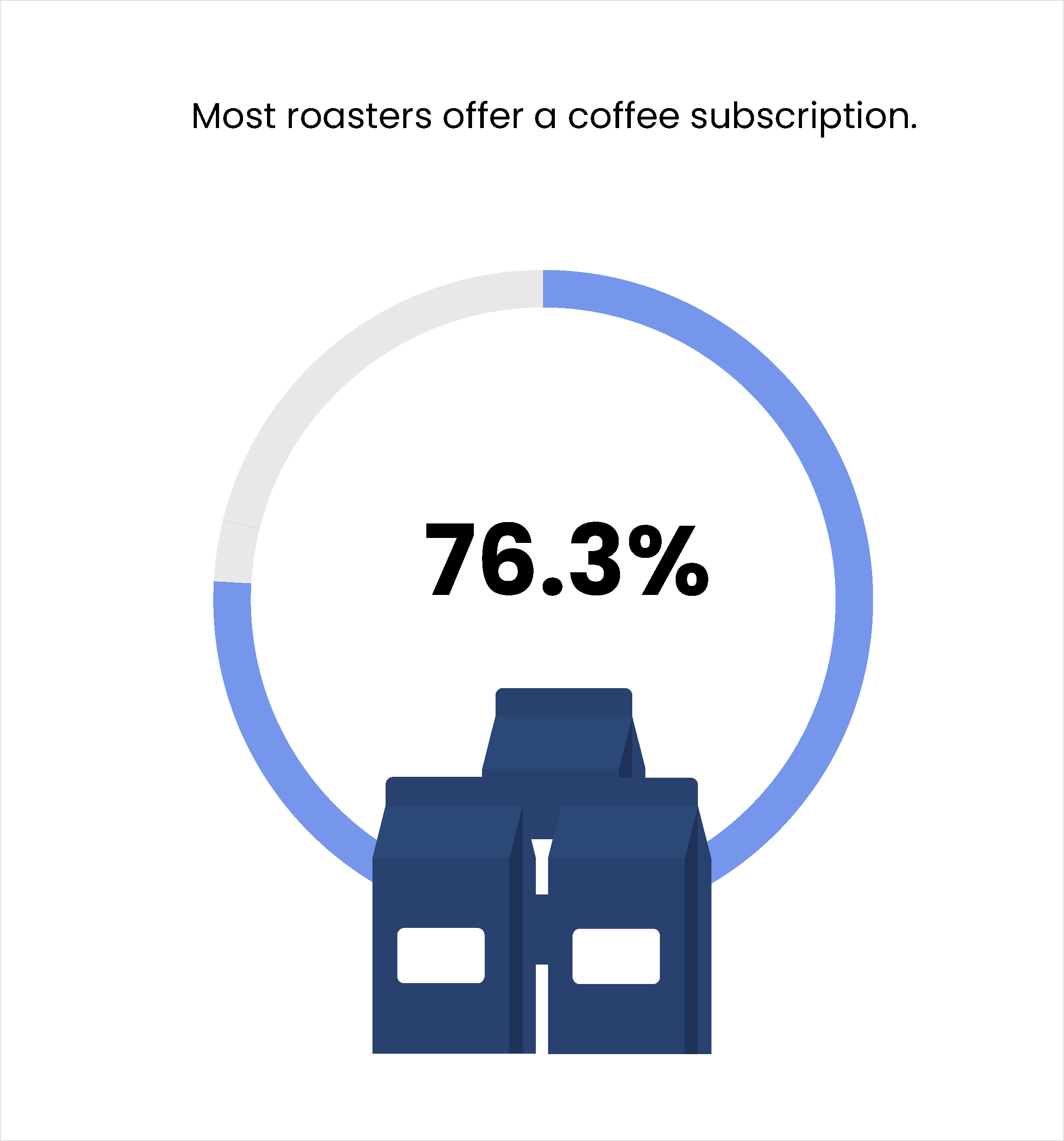
We found that 76.3% of roasters offer coffee subscriptions.
If you are a roaster and do not have such a service, then consider this option to increase your sales.
78.2% of roasters sell coffee beans wholesale.
People are becoming more and more involved in coffee culture.
42.9% of people drink coffee because of the taste, while only 26.2% drink it to recharge.
This means that delicious coffee could be one of the reasons people choose certain places to have breakfast or lunch.
It is possible that coffee shops, bakeries, and other stores will want to add freshly roasted coffee to their assortment.
However, roasting the coffee themselves can be expensive and difficult.
Instead, shops can entrust this work to professional roasters.
We were faced with the task of finding out how many roasters offer wholesale coffee to other businesses in the service sector.
Here's what we learned:
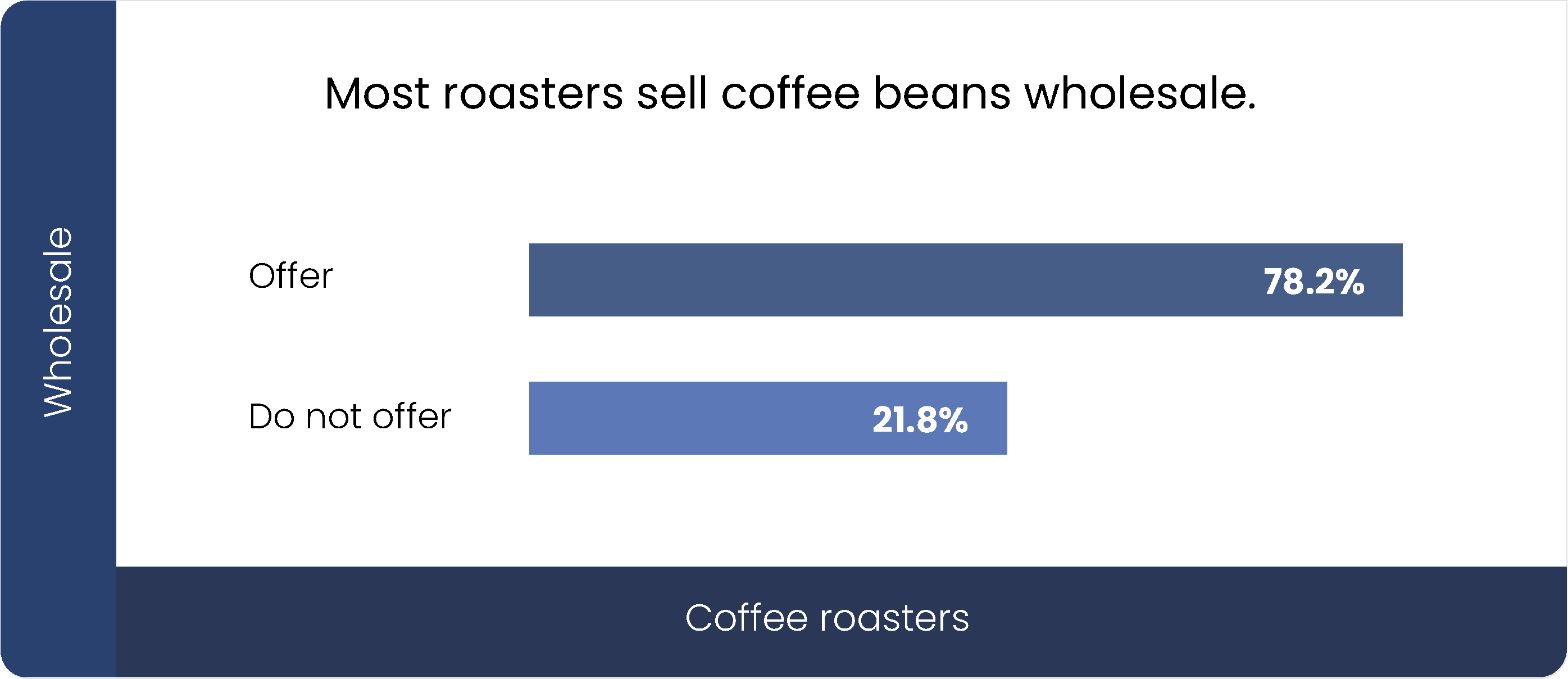
78.2% of roasters sell coffee beans wholesale.
This means that most coffee roasters are open to this kind of collaboration.
64.6% of roasters don't blog.
In 2020, Americans were 24% less likely than in 2015 to prepare coffee in a traditional drip coffee maker.
Americans have become interested in other brewing methods.
Many people prefer coffee makers that can brew just one cup. Their popularity has grown by almost 50%.
People want to drink delicious coffee.
They're looking for information on how to choose coffee beans, how to store them correctly, how to use different types of coffee makers and espresso machines, and so on.
It seems that roasters would be well-positioned to inform consumers about how to correctly brew coffee beans and best reveal the beans' tastes and aromas.
But we found that many roasters have dropped the ball when it comes to blogging.
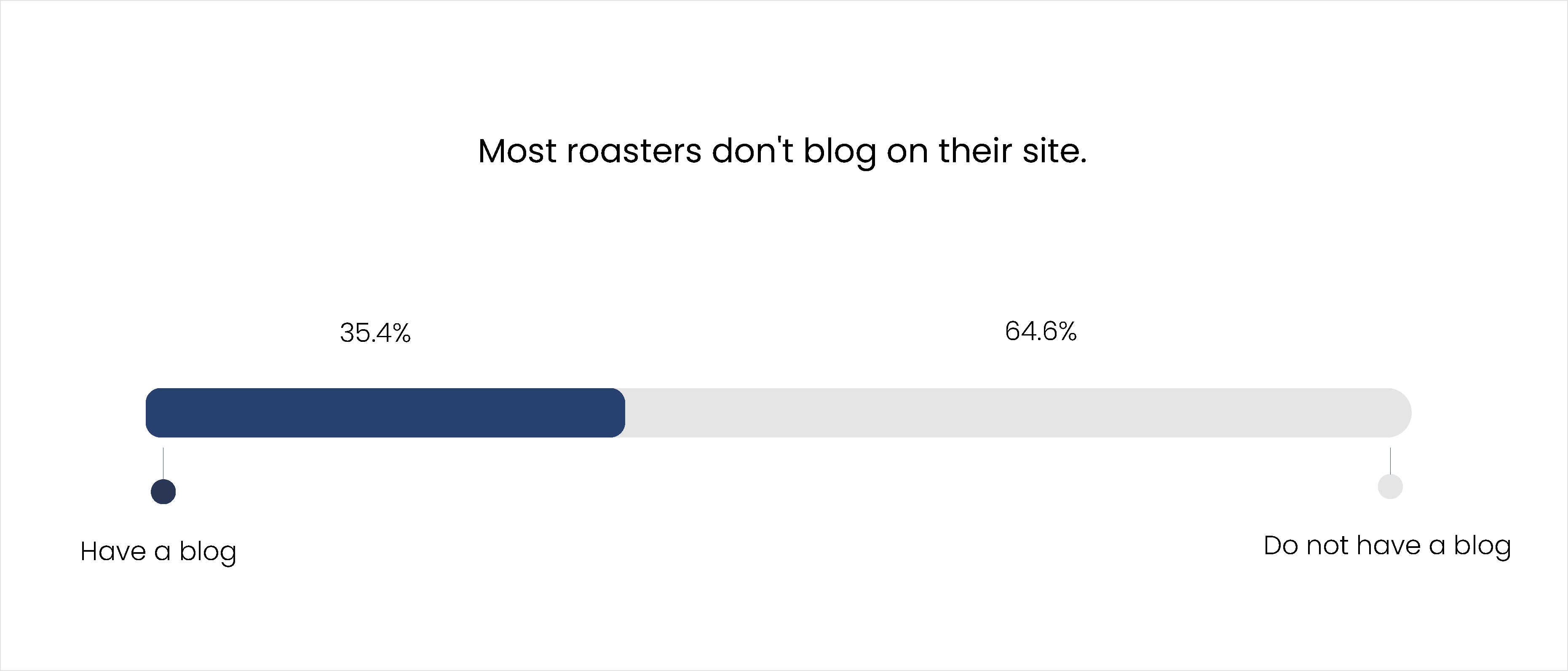
After analyzing the sites of 481 companies, we found that 64.6% of roasters do not blog on their sites.
They are not teaching their audience how to properly brew and drink coffee.
69.4% of coffee roasters collect customer emails.
Most roasters strive to stay connected with their customers.
In the course of our research, we analyzed coffee roasters' sites to find out if it is possible to receive company news by email.
Here's what we learned:
69.4% of coffee roasters collect customer emails in order to send newsletters.
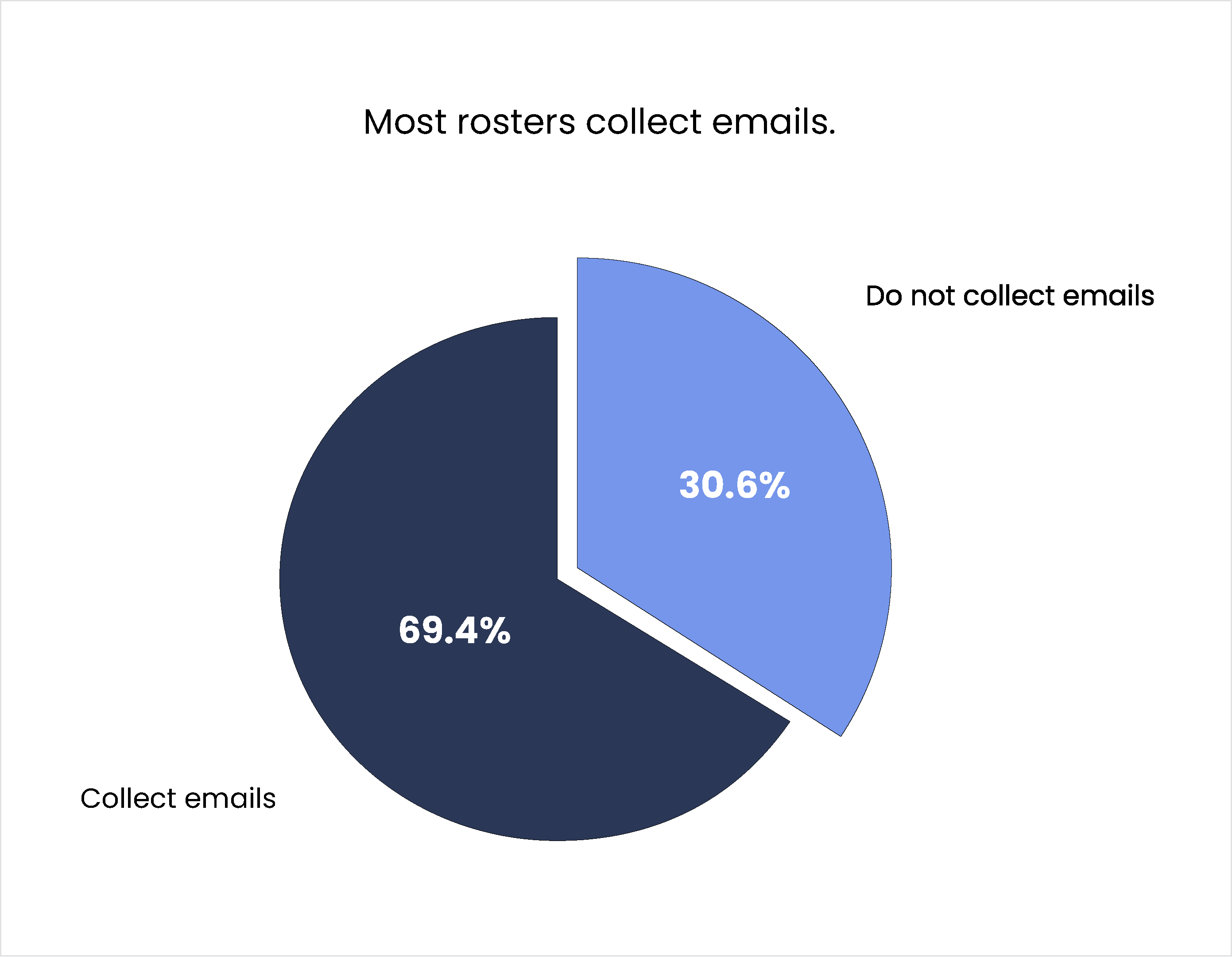
People choose to follower roasters' accounts on Instagram.
Although many companies do not blog on their websites, they do maintain accounts on social networks.
Coffee roasters choose to use Instagram, Facebook, and less often Twitter.
94.8% of roasters have Instagram accounts, 93.5% of roasters have Facebook pages, and only 54.7% of roasters have Twitter accounts.
In our research, we found that most of the time people follow coffee roasters on Instagram.
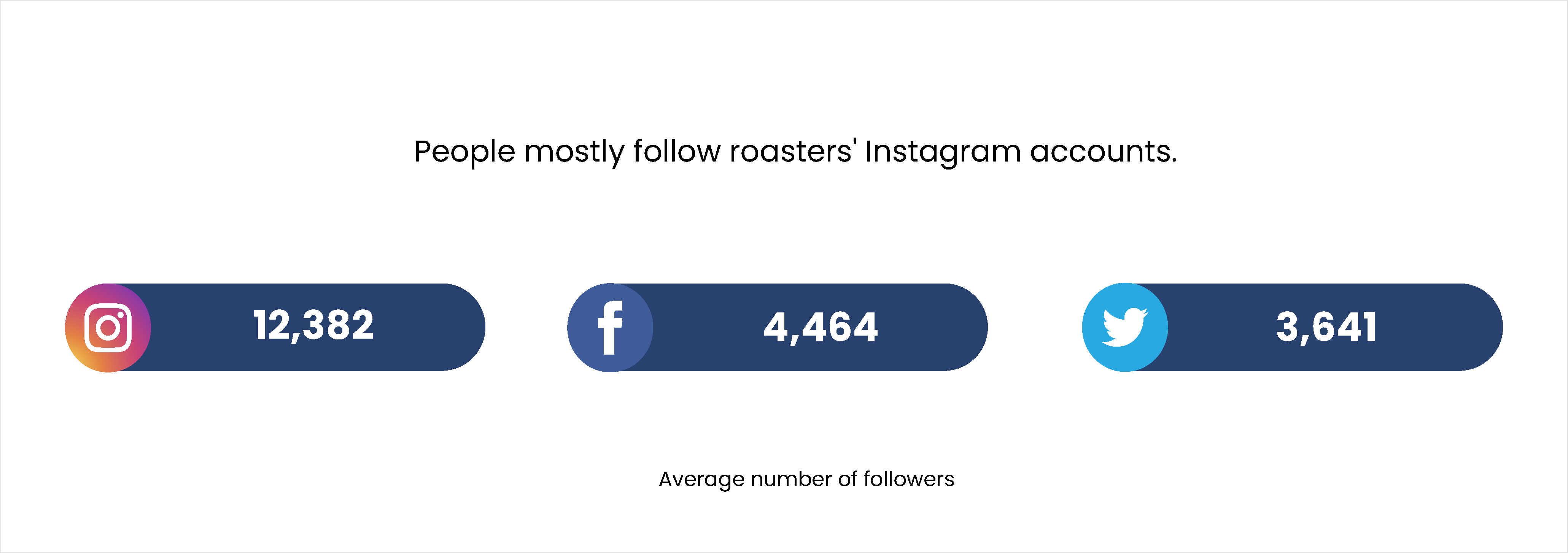
Roasters' average number of followers on Instagram is 12,382, compared to 4,464 on Facebook and 3,641 on Twitter.
If you are roasting coffee, you should focus your efforts on growing your Instagram account.
It can become one of your main sources of contact with your customers.
Conclusion
If you're interested in learning more about how we collected and analyzed data for this study, here's a PDF of our methods.
Upgrade Your Espresso Machine
Best Espresso Machines for Home
Looking for an espresso machine for your home? Check out our list of the best picks. We have budget options, machines that can brew lattes and cappuccinos, machines for those who just want to press a button, and more. We also provide all the information you need about types of espresso machines, useful features, and important accessories to make your choice easier.
If you want a home espresso machine but don't want to break the bank, we recommend checking out our list of the best budget options. On this list, you will find budget espresso machines that will help you brew delicious coffee and will last a long time. We studied different models, compared their characteristics, watched video reviews, and read written reviews. Our barista even tested each espresso machine to ensure they all make quality drinks.
Best Super Automatic Espresso Machines
If you drink a lot of coffee but don't have tons of time or top-notch barista skills, check out our list of the best super-automatic espresso machines. Each model allows you to brew quality coffee with minimal effort. We paid special attention to espresso machines that can prepare cappuccinos and lattes.
